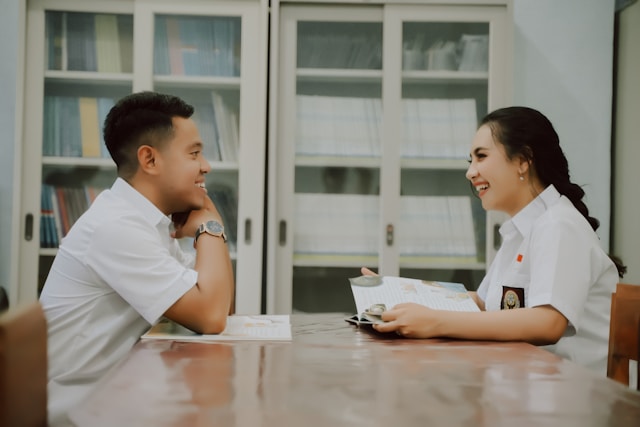Many of us have had experience in an interview setting – either as an interviewer or being interviewed. It can be an uncomfortable and nerve-wracking time, with potentially quite a lot on the line. If you are on the selection panel, how can you behave to make it as good an experience as possible? Here are some tips.
- Preparation. Have all your paperwork to hand, know who you are meeting, know the questions you are asking and your role on the panel. Don’t fly into the room in chaos, not only does that not give a great impression (why would they want to come and work for you??), you aren’t giving the candidates a fair opportunity.
- Space. Ensure you create space around the edges ie before, in between and after the interviews. You owe it to the people you are interviewing to be able to give them your focus and attention. I know that’s hard in amongst a pressurised diary, but this isn’t just a nice to have, its essential to being a good interviewer.
Take a breath, ensure you are hydrated and comfortable and be present.

- Questions. Ask good ones! You will have a fixed set of questions you will be asking each candidate, and they must relate to the requirements of the role. Follow up or probing questions will need to respond to the answers they have given. Not just what has piqued your personal interest, they must directly relate to the criteria or competence you are exploring. Think of these follow up questions as another opportunity for the candidate to give you a full answer and fill in any gaps that their first answer didn’t quite reach. “Can you tell me a little more about your direct involvement in that”, “What reflections do you have about how you might do it differently next time” “What specific methodology did you use in that situation”. Keep them clear, succinct, open and interesting.
- Connect. Remember the interview isn’t there to trip them up, it’s to give them every opportunity to be at their best. Your part in that is being clear and calm and putting them at ease. Give them space to pause and think, or the chance to come back to a question if they are really stuck. Be interested in what they are saying, keep the tone conversational and check your own body language. And don’t forget to offer them time at the end to ask their questions and add anything further.
“The interview should give them every opportunity to be at their best”
- Bias. It’s very easy for personal bias to creep into a selection process. And I don’t just mean the obvious horror stories of discrimination like “So are you planning to have children soon?”. Don’t do that, obviously. But bias can be so much more subtle and often unintended. For example, when we are drawn to people “like us” – whether that’s gender, race, background, profession, sports teams – we can inadvertently consider their answers more favourably or develop a more positive rapport. When we are interviewing internal candidates, this can be more prevalent and so is one to watch out for. Having a panel interview and consistent questions will reduce the impact of this, but you have a responsibility to check your own behaviour and decisions. Also consider that their interview performance and body language will be affected by nerves, confidence and other factors such as neurodiversity or cultural norms.
- Enjoy yourself. Yes, really! Think of interviews as an opportunity to meet lots of fascinating people and hear about their lives, what a privilege that is. You will also be stretching your own skills and knowledge. If you are nervous, try reframing that as anticipation or curiosity. And remember the candidates will definitely be more nervous than you!

Make sure you have completed your Unconscious Bias training before you join any panel. This inclusive language and communication module is recommended too. And for an interesting take on good conversations generally, I love this TED talk from Celeste Headlee. Whilst not specifically about selection interviews it includes some relevant ideas. This article explores a wide range of different types of bias.
Juliet Flynn, Learning and Organisational Development Team
 People, Culture and Inclusion
People, Culture and Inclusion Juliet Flynn
Juliet Flynn 479
479


